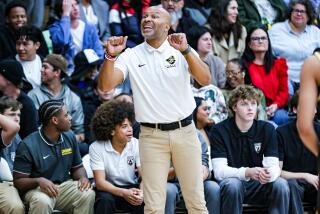Drinking by Young Athletes Merits Attention
- Share via
It’s imperative that the exploration of ephedrine in dietary supplements continue. Athletes who are tempted to use such products need to know the risks.
But lost in the examination of such products as Ultimate Orange, Ultimate Punch and Xenadrine is the failure to focus attention on the dangers of teenagers experimenting with products like Jack Daniels, Miller Lite and Budweiser.
Alcohol, not dietary supplements, kills, maims and ruins the lives of young people by the thousands.
In 1998, 3,709 people ages 16 to 24 died in alcohol-related traffic accidents, according to the National Traffic Highway Safety Administration.
How many of the victims were athletes, I don’t know. But alcohol is as popular as Gatorade in our sports culture and football season brings out some of the worst offenders.
It should be mandatory that high school football coaches address the issue of alcohol, its ramifications and consequences.
And they shouldn’t be winking or letting even one player giggle while they review the subject.
This is a serious topic that can save lives and prevent tragedies.
The first Friday night of the football season is the first big party night of the new school year. It’s the first test of peer pressure, where if one popular student drinks, others inevitably follow.
But for every player who ignores warnings of suspension or other disciplinary action, there are others who possess the self-confidence and self-esteem to say no.
They’re the ones who think before they act. They’re the ones not willing to throw away months of hard work just to impress a so-called friend by joining them in a drink.
Coaches must jettison their reluctance to intercede for fear they are entering parental territory.
Yes, it’s up to parents to make sure their sons and daughters understand the rules and laws on drinking. But it remains a privilege, not a right, to play for a sports team, and coaches are responsible for establishing their team’s code of conduct.
Coaches can’t hide from the issue.
An NCAA survey of more than 21,000 college athletes released this summer showed that 79.5% reported using alcohol in the last year, with 43.3% saying they binge drink.
The vast majority surely didn’t start drinking as college freshmen. That means high school and perhaps middle school is when the drinking started.
In the new movie, “Summer Catch,” about playing college baseball in the Cape Cod League, the players are seen repeatedly drinking beer at a local bar.
Since most Cape Cod players are college sophomores or juniors and below the minimum drinking age of 21, how are they acquiring their beer? Are the scenes realistic, or Hollywood embellishment?
Every time I see a story about police using undercover officers to catch business establishments illegally selling alcohol to juveniles, I take comfort that people are trying to prevent under-age drinking.
My interest is personal. As a sportswriter, I’m tired of having to write stories about athletes killed by drunk drivers or arrested for drunk driving.
Just last April, baseball player Nolan LeMar made the papers, but not for his exploits on the field.
LeMar, a 19-year-old co-captain of the College of the Canyons team, was driving his sports-utility vehicle when an allegedly drunk driver crossed the road’s median and struck him head-on.
LeMar died instantly.
It shouldn’t be considered cool for a 17-year-old to be guzzling beer at a party. It might be part of teenage life these days, but it’s not acceptable.
*
Eric Sondheimer can be reached at eric.sondheimer@latimes.com.
More to Read
Go beyond the scoreboard
Get the latest on L.A.'s teams in the daily Sports Report newsletter.
You may occasionally receive promotional content from the Los Angeles Times.











